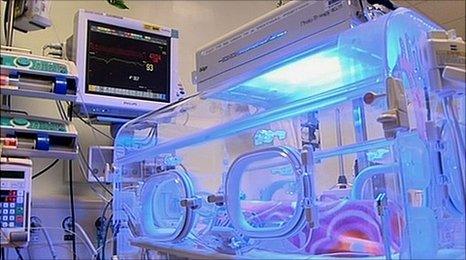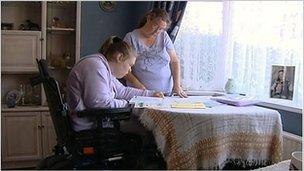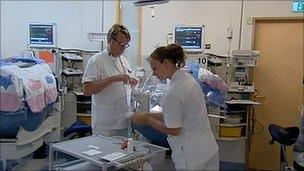Premature babies battle for survival at 'edge of life'
- Published

The NHS spends more than £10m a year on babies born at 23 weeks
Babies born prematurely in the 23rd week of pregnancy exist on the very edge of life. A few go on to become "miracle babies", but most die. The figures are stark, only nine out of 100 will survive, and of that number most are disabled. Is it always right to keep them alive?
"I can't really get my head round how they've managed to keep her alive."
Lucy's daughter Matilda was born four months early at Birmingham Women's Hospital, weighing one pound one ounce.
Within 20 seconds of her birth, her tiny body was placed into a plastic bag to prevent her losing too much heat or moisture.
She was carefully transferred into an incubator and hooked up to tubes and gadgets. Cutting-edge technology has been keeping her alive for four weeks.
Had Matilda been born one week earlier at 22 weeks - she would usually have been considered a miscarriage.
Only one out of a hundred babies born at 23 weeks will live a fully able-bodied life One week later at 24 weeks, her chances of survival would be much higher.
Thanks to decades of improving medical science 23 weeks is now considered the "edge of viability". It is one week less than the limit for abortion at 24 weeks.
Senior nurse Katherine Rutherford looked after Matilda immediately after birth - and knows what parents like Lucy go through.
She gave birth prematurely to her daughter Heather, who weighed three pounds having been born at 26 weeks.
In the first few weeks of her life a haemorrhage left Heather permanently quadriplegic.
"I try and explain what the problems are and what the outcomes are liable to be," said Katherine.
"But being a parent you generally hear what you want to hear. You just see a baby in front of you and you want that child to survive."
Heather was born at 26 weeks, which was the very edge of viability in 1990. Now 21, she struggles with her disabilities.
"All I can use of my four limbs is my left arm," said Heather.

Heather Rutherford has no routine help from the NHS but a local authority provides carers
"Without carers to lift me into my wheelchair, I'm not able to get myself anything to eat."
Carers arrive at Heather's home every morning and hoist her out of bed using special lifting machinery.
"Basically if my mother or the carers don't come, I'm stuck in bed all day," she said.
Heather had a happy childhood but has found the transition into adulthood hard, and has suffered from depression.
"I had six months of counselling. I was crying every single night.
"I just didn't know where to turn. Horrible things were going through my head.
"I just wished I could end my life. There is obviously nothing else for me in my life, so what is the point of carrying on?"
Resuscitating babies at 23 weeks is not universal. In Holland the policy is to not intervene with babies born at this time, and to allow them to die a dignified death.
"That is how nature works there is no way you can help these babies," said Professor Arend Bos from the Dutch Society of Neonatologists.
"I think we are doing more harm to treat them and after two or three hours or days or six weeks the infant will die anyway, having had a lot of suffering and pain that doesn't have any purpose to it."
So should we be doing the same in the UK? Is saving babies at the edge of "viability", medicine at its most pioneering and brilliant? Or is science pushing the edge of nature too far?
Over the last 15 years tremendous progress in medicine has meant the survival rate of babies born in the 24th week or later has almost doubled.
But Imogen Morgan, clinical director at the neonatal unit said: "Outcomes for babies at 23 weeks are not changing dramatically and that suggests you are near a biological limit of nature."
Anne Aukett, a consultant paediatrician said medicine was keeping alive babies born at 23 weeks for longer, although survival rates have not increased.
"Overall survival rates have not improved. We are keeping them alive longer before they die. You spend all that money for weeks and then the baby doesn't survive. It does not seem like a good use of public money."
Indeed, we are spending increasingly more on neonatal intensive care, but those who survive it, like Heather, are left to fend for themselves when they reach 18.

In Holland doctors want to concentrate resources on the most successful procedures
With few prospects, Heather feels abandoned by the very society that was so keen for her to live.
"If you are willing to support someone at the beginning of life you should be willing to support them to the end," Anne Aukett said.
Matilda survived open heart surgery and was allowed home after five months in hospital.
"She's gone from one pound one to seven pounds in five months - she's come a long way," said her mother Lucy.
Lucy said she was aware it would be a while before she knew if being born so prematurely would have any lasting consequences for Matilda.
"Fingers crossed we won't have to spend very much more time in hospital, but we are prepared for coming back. Hopefully she'll be OK."
In the six months I spent at Birmingham Women's Hospital making this documentary for BBC Two, Matilda was the only 23-week baby to survive.
My feeling is that resuscitation should be the exception rather than the rule. Only those babies with a decent chance of survival should be resuscitated.
And that the real priority for the NHS - especially in these straitened times - should be in finding ways of preventing Britain from having one of the worst premature birth rates in Europe.
Whatever we decide, there is no question in my mind that we must start providing lifelong care to any baby which is kept alive but then has to live with disabilities, like Heather.
23 Week Babies: The Price of Life is on BBC Two, 9 March 2100 GMT.
- Published7 March 2011
- Published3 December 2010
- Published2 November 2010